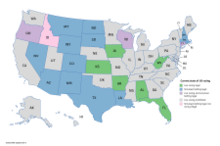Greyhound racing in the United States
Greyhound racing in the United States is a sport and regular gambling activity. The sport is regulated by state or local law and the greyhound care is regulated by National Association of State of Racing Commissions and the American Greyhound Council (AGC).[1] The AGC is jointly run by the National Greyhound Association.[2]
History
The first greyhound in the United States was registered in 1894[3] and the oval form of racing with a mechanical or artificial hare was started by Owen Patrick Smith in 1912. California was the first state to introduce an oval greyhound track in May 1920, it was the first mechanical lure oval circuit in the world. Smith opened the track at Emeryville.[4] The Emeryville arena was torn down in February 1920 to make way for the construction of a modern racetrack using the mechanical lure, described in the press as the "automatic rabbit" [5] The first race at the new park was on Saturday, May 29, 1920 [6]
A greyhound called Joe Dump set a world record of 31 race wins in 1978 and 1979; the red brindle dog was trained by JC Stanley and owned by Joe Fallon and raced primarily at Greenetrack. The record was subsequently beaten by Ballyregan Bob.[7] A greyhound called Leos Midas won for the 103rd time in 1998 to equal the record number of races won, the race was at Orange Park.[8]In November 2018 the Florida public passed a State Constitutional Amendment making betting on live greyhound racing at Florida tracks illegal from 2021.[9][10]
List of United States active tracks
There are currently eight active tracks in the United States. Active greyhound tracks in Florida, where greyhound racing will be phased out by 2020, are highlighted in yellow.
Active greyhound tracks in Arkansas will be phased out by 2021 are highlighted in blue.
| Name | Location | State | Notes |
|---|---|---|---|
| Southland Park Gaming and Racing | West Memphis | Arkansas | |
| Derby Lane Greyhound Track | St. Petersburg | Florida | |
| Orange Park Kennel Club | Orange Park | ||
| Palm Beach Kennel Club | West Palm Beach | ||
| Q Casino | Dubuque | Iowa | Formerly Dubuque Greyhound Park |
| Gulf Coast Racing | Corpus Christi | Texas | |
| Gulf Greyhound Park | La Marque | ||
| Wheeling Island Hotel-Casino-Racetrack | Wheeling | West Virginia |
By state

Alabama
Arizona
- Amado Greyhound Park, Amado (1963-1983)
- Apache Greyhound Park, Apache Junction (1959-2004)
- Black Canyon Greyhound Park, Black Canyon City (1965-1982)
- Phoenix Greyhound Park, Phoenix (1954-2009)
- Tucson Greyhound Park, Tucson (1944-2016)[13]
- Yuma Greyhound Park, Yuma (1965-1993)
Arkansas
- Southland Park Gaming and Racing, West Memphis, (1956-present).[14]
California
- Blue Star Amusement Park, Emeryville (1920-1920)
Colorado
- Clover Leaf, Loveland (1955-2006)
- Interstate, Byers (1971-2006)
- Mile High, Commerce City (1949-2008)[15]
- Pueblo Greyhound Park, Pueblo (1949-1999)
- Rocky Mountain Greyhound Park, Colorado Springs (1948-2005)
Connecticut
- Plainfield Greyhound Park, Plainfield (1976-2005)
- Shoreline Star Greyhound Park, Bridgeport (1995-2006)[16]
Florida

- Biscayne Greyhound Track, Miami Shores (1926-1995)
- Daytona Beach Racing and Card Club, Daytona Beach (1948-2020) [17]
- Derby Lane Greyhound Track, St. Petersburg (1925-2020)
- Ebro Greyhound Track, Ebro (1955-2019)
- Flagler Greyhound Track, Miami (1932-2018)
- Hialeah Park Race Track, Miami (1922-?)
- Hollywood Greyhound Track, Hallandale Beach (1934-2020)
- Jacksonville Greyhound Track, Jacksonville (1935-2007)
- Jefferson County Kennel Club, Monticello (1959-2020)
- Key West Greyhound Track, Key West (1953-?)
- Melbourne Greyhound Park, Melbourne (-2020)
- Naples-Fort Myers Track and Entertainment Center, Bonita Springs (1957-2020)
- Orange Park Kennel Club, Orange Park (1946-2020)
- Palm Beach Kennel Club, West Palm Beach (1932-2020)
- Sanford-Orlando Kennel Club, Longwood (1935-2020)
- Pensacola Greyhound Track, Pensacola (1946-2019)
- St.Johns Bayard Greyhound Track, Jacksonville (1977-2000)
- Sarasota Kennel Club, Sarasota (1944-2020)
- Seminole Greyhound Park, Casselberry (1981-2000)
- Tampa Greyhound Track, Tampa (1933-2015)
Iowa
- Bluffs Run, Council Bluffs (1986-2015)
- Q Casino, Dubuque (1985-present).[19]
- Waterloo Greyhound Park, Waterloo (1986-1996)
Kansas
- The Woodlands, Kansas City (1989-2008)
Massachusetts
- Raynham Greyhound Park, Raynham (1940-2009)
- Wonderland Greyhound Park, Revere (1935-2010)
New Hampshire
- Belmont Lakes Region Greyhound Track, Belmont (1975-2005)
- Hinsdale Greyhound Park, Hinsdale (1973-2008)
- Seabrook Greyhound Track, Seabrook (1973-2010)[20]
Oregon
- Multnomah Greyhound Park, Fairview (1933-2004)[21]
Rhode Island
- Lincoln City Greyhound Park, Lincoln (1977-2009)[22]
South Dakota
- Black Hills, Rapid City (1949-1994)
- Sodrac Park, Sioux City (1955-1995)
Texas
Vermont
- Green Mountain Race Track, Pownal (1976-1991)[26]
West Virginia
- Mardi Gras Casino and Resort, Cross Lanes (1985-2018)
- Wheeling Island Hotel-Casino-Racetrack, Wheeling (1976-present)
Welfare

At American tracks, greyhounds are kept in kennel compounds, in crates that are approximately three feet wide, four feet deep, and three feet high.[27] Most kennels turn the dogs out 4 to 6 times per day. Each turnout can be from 30 to 90 minutes.[28] Because greyhound kennels often house upwards of 50–70 dogs, crating is essential to the safety and wellbeing of canine life.[29]
In addition to state law and regulations, most tracks adopt their own rules, policies and procedures. In exchange for the right to race their greyhounds at the track, kennel owners must sign contracts in which they agree to abide by all track rules, including those pertaining to animal welfare. If kennel owners violate these contract clauses, they stand to lose their track privileges and even their racing licenses. In order to be licensed to own, handle a race dog or work in a kennel, dog professionals must have a FBI background check and be licensed by the states. Additionally, the National Greyhound Association holds their membership to strict standards towards the care and handling of the dogs. Failure to comply can result in lifetime termination of membership and a ban from the sport.
Criticism
In Florida the amount gambled at dog tracks declined by 72% between 1990 and 2013.[30] According to a study commissioned by the legislature, the state lost between $1 million and $3.3 million on greyhound racing in 2012.[31] As recently as 2016, Florida industry professionals questioned if wagering was declining or transitioning to unreported online formats.[32] In 2017, an investigation by the animal protection organization PETA exposed a Pet Blood Bank in Cherokee, Texas on a privately owned farm, was using farm bred greyhounds and 150 former racing greyhounds. The greyhounds were living in unacceptable conditions and suffered neglect.[33][34] The National Greyhound Association (NGA) then barred members from directly sending greyhounds to blood banks.[35] The farm owned by the blood bank and unconnected to the NGA is due to close following the investigation.[33]
References
- "Greyhound Care at the Track". American Greyhound Council.
- "Home Page". National Greyhound Association.
- Barnes, Julia (1988). Daily Mirror Greyhound Fact File. Ringpress Books. ISBN 0-948955-15-5.
- Jane Alexiadis, What's it Worth? Greyhound collection sale to benefit charity, San Jose Mercury News (23 December 2011).
- "Emeryville Arena Being Torn Down; Lumber Used To Build Coursing Park— Automatic Rabbit Electrically Controlled Brings Ancient Sport Back Within Law", Oakland Tribune, February 13, 1920, p18
- "Emeryville Coursing Park Opens Saturday", Oakland Tribune, May 27, 1920, p18
- "No plans to move Joe Dump to another greyhound track". The Tuscaloosa News. 1978.
- "Monthly Greyhound Star (Remember When 1998) April edition". Greyhound Star.
- "Greyhound racing ban signed into law in Colorado". The Denver Post. The Associated Press. 10 March 2014.
- "Greyhound Racing Banned in Florida". Greyhound Star.
- "Live Racing". Birmingham greyhound Racecourse.
- "As greyhound racing declines nationwide, the Birmingham Race Course is in 'survival mode". AL.com.
- "Greyhound Racing". Arizona Department of Gaming Division of Racing.
- "Florida votes end to greyhound racing; Arkansas track got a new lifeline". Arkansas Times.
- "Colorado tracks gone (forever) to the dogs". The Denver Post.
- "Lights Dimming At the Dog Tracks Where It All Began". New York Times.
- "Live Greyhound Racing Will Come to a Conclusion on Saturday, March 28, 2020". Daytona Beach Racing and Card Club.
- "Racing Comes to Grove City". Grove City History.
- "Iowa Greyhound Park". Iowa Racing and Gaming Commission.
- "New Hampshire Ends Live Greyhound Racing; Will Florida Follow Suit?". Broward Palm Beach New Times.
- "Greyhound Racing Ban Falters In Oregon Legislature". OPB.
- "HARD TIMES AT TWIN RIVER". The College Hill Independent.
- "Valley Race Park". Valley Race Park.
- "Gulf Greyhound Park". Gulf Greyhound Park.
- "Gulf Coast Racing". Gulf Coast Racing.
- "Lending firm seeks to foreclose on former Green Mountain Race Track site". Bennington Banner.
- "GREY2K USA Report on Greyhound Racing in Texas (February 2013)" (PDF). grey2kusa.org. Retrieved 8 August 2016.
- "Off to the Races – Greyhound Facts". greyhoundfacts.org. Retrieved 8 August 2016.
- "National Greyhound Association: Debunking Great2K Lies about greyhound racing". www.ngagreyhounds.com.
- "Annual Reports". Florida Department of Business and Professional Regulation, Division of Pari-Mutuel Wagering. Archived from the original on 13 March 2014. Retrieved 7 March 2014.
- "Gambling Impact Study" (PDF). Spectrum Gaming Group. Retrieved 28 October 2013.
- "Online Wager". Sunshine State News. Retrieved 22 February 2016.
- "Discarded Greyhounds Imprisoned, Neglected, and Farmed for Their Blood". PETA Investigations. Retrieved 2018-09-18.
- Karin Brulliard, “Allegations of Neglect at Dog Blood Bank Shine Light on An Unregulated Industry,” The Washington Post, 23 Sep. 2017
- "National Greyhound Association: News". www.ngagreyhounds.com. Retrieved 2018-09-18.